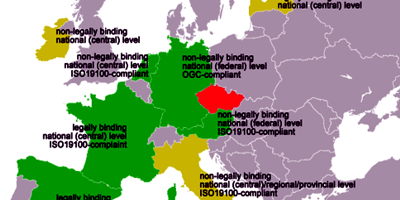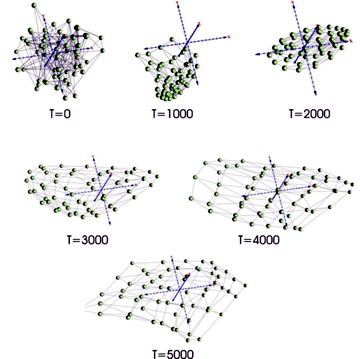
 Plan4all is a European project co-funded by the Community programme eContentplus. The main aim of the project is to harmonise spatial planning data and related metadata according to the INSPIRE principles. The Plan4all project should contribute to the standardisation in the field of spatial data from spatial planning point of view. Its activities and results will become a reference material for INSPIRE initiative; especially for data specification.
Plan4all is a European project co-funded by the Community programme eContentplus. The main aim of the project is to harmonise spatial planning data and related metadata according to the INSPIRE principles. The Plan4all project should contribute to the standardisation in the field of spatial data from spatial planning point of view. Its activities and results will become a reference material for INSPIRE initiative; especially for data specification.
Plan4all is focused on the following 7 spatial data themes as outlined in Annex II and III of the INSPIRE Directive:
Land cover
Land use
Utility and Governmental services
Production and industrial facilities
Agricultural and aquaculture facilities
Area management/restriction/regulation zones and reporting units
Natural risk zones
The aim of this article is to introduce you with the results of the Plan4all project that has successfully concluded its first year. It is not an exhaustive description containing all the results but only a summary of the selected ones. One of them is the analysis of conceptual data models for selected themes used in single countries and the other one is the data sharing requirements.
Plan4all – “Analysis of conceptual data models for selected themes used in single countries”
The report “Analysis of conceptual data models for selected themes used in single countries” gives an overview on the results of the work done in Task 4.1 for collecting examples of data specifications from the European countries of the Plan4all Consortium. These results are meant to be the basis of the work to be done in Task 4.2, when common data models for the seven selected INSPIRE themes will be developed taking into account the existing material and the developers’ and users’ needs.
The activities carried out had two main objectives:
To fulfil these objectives, a specific questionnaire has been sent to partners, and to get uniform answers to the questionnaire, one country coordinator has been appointed for each country of the Consortium. The coordinators were in charge of collecting the case studies that they deemed to be the most relevant or representative of the situation in their countries, taking care of the relations with the institutions providing them, filling in the questionnaire and submitting it.

The questionnaire was divided in two parts: the former regarding the general situation of the country, the latter being case-study specific and containing a series of questions about the compliance of the case study with the requirements and recommendations of the INSPIRE implementing rules.
The questionnaire contained also free text fields so as to allow the respondent to explain/justify why certain issues, recommended or required by INSPIRE, had not been taken into consideration by the developers, and this is meant to be valid information for who is working in the process of implementing the INSPIRE Directive.
Information has been provided for the following countries: Austria,Czech Republic, France, Germany, Ireland, Italy, Latvia, the Netherlands and Spain.
A result of the first section of the survey has been a general overview on the standards existing in the different countries, and on their compliance with ISO and INSPIRE.
For the second section of the survey, a total number of 19 case studies has been collected; the following diagram shows the coverage of the seven selected INSPIRE themes, according to the partners’ responses. On the left, the abbreviations for the INSPIRE themes; the different colours indicate from what countries the case studies come from (legend on the right).

Many data specifications collected cover more than one INSPIRE theme, and often the themes are covered only partially. The themes are often overlapping, and specifying which theme is covered by each case study implies of course a certain degree of subjectivity.
The report provides some statistics about the results of both sections of the questionnaire, summarised by figures like the following. An assessment of the overall compliance with INSPIRE of the case studies had been made by simply adding up the number of “yes” and “no” answers to the questions relating to the compliance with single INSPIRE requirements and recommendations.

The non-compliance with INSPIRE doesn’t necessarily have to be considered a weakness of the single case study or of the overall situation in Europe. Indeed, one of the aims of this work was to highlight the reasons why the compliance to certain INSPIRE requirements or recommendations is sometimes not desirable, difficult to obtain, or even useless, in consideration of the purposes of the single data specifications.

This work intended to help the INSPIRE process to adjust some of its specifications by taking into account the needs of the developers of the data models and the users of the data around Europe.
Plan4all – Data Sharing Requirements summary
The purpose of D5.1 is to formalize the Plan4all networking and data sharing requirements as well to make recommendations for architecture and suggest possible components in the commercial and open source domains which may be suitable to implement the Plan4all networking service infrastructure.The content is based on analysis of the INSPIRE networking requirements, the output from previous work packages – namely WPs 2 and 3 as well as data and survey results collected specifically for this work package..
The document looks on user needs from the perspective of describing them in the simplest possible manner while retaining the level of technical sophistication required for effective interpretation and implementation of the findings in subsequent tasks. For technical consistency, the work is based on the Software Development Life Cycle methodology and the IEEE Software Requirements Specification documentation template for describing an INSPIRE compliant Plan4all networking architecture.

The deliverable is mainly intended for technical partners in charge of designing the interoperable networking services architecture. In addition, this deliverable is relevant to any organisation and individual in the Plan4all project interested in learning about the Plan4all architecture.
The work heavily emphasizes the need for a pragmatic approach which meets the technical scientific requirements of the overall INSPIRE community while at the same time being possible to implement for an organisation who has spatial planning as their core business. In smaller local planning authorities, the resources are tight and the skills and capacity required for running a full-fledged Spatial Data Infrastructure node are not available. Yet, it is from this level that the detailed spatial plans emerge.
Furthermore, existing infrastructure adaptation to individual needs were considered and are discussed in the document. In addition to INSPIRE requirements, the background material for the assessments made in the deliverable is knowledge, experience and best practice on data sharing and networking services from the joint Plan4all consortium.
——————————————————————————-
Authors: Flavio Camerata, Giuseppina Pellegrino, Runar Bergheim, Peteris Bruns, Karel Charvát and Tomáš Mildorf